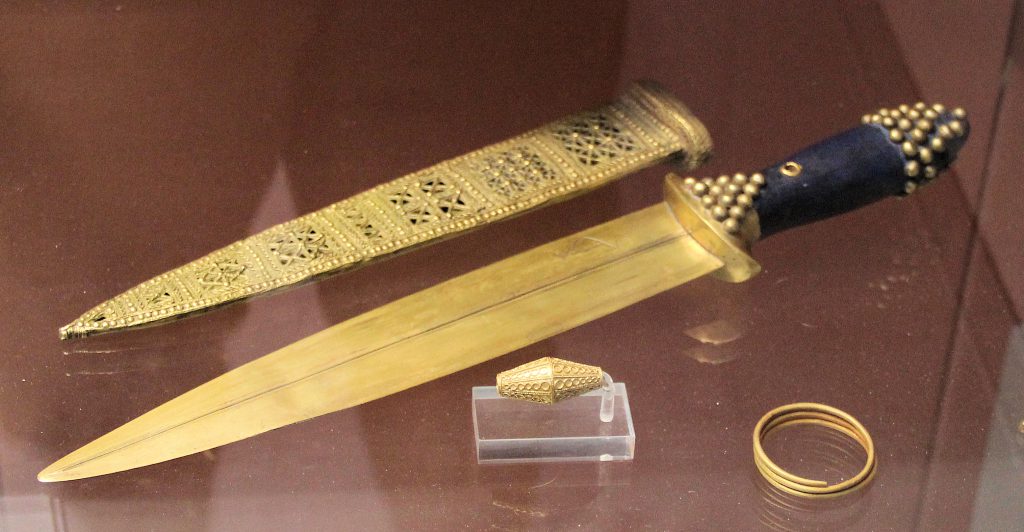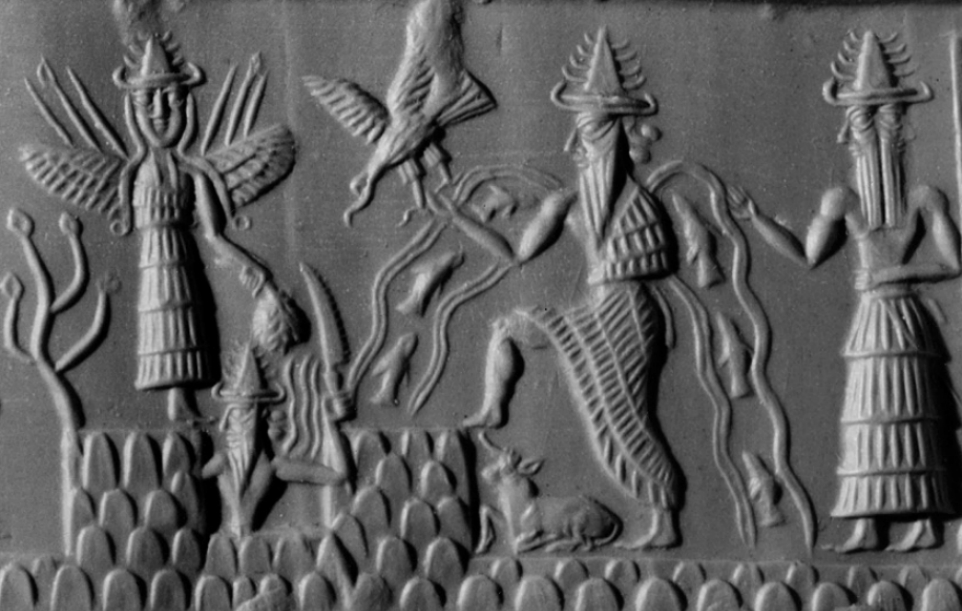Diane Wolkenstein and Samuel Noah Kramer, Inanna: Queen of Heaven and Earth: Her Stories and Hymns from Sumer, Harper & Row, New York, 1983.
Samuel Noah Kramer was a Professor at the University of Pennsylvania and one of the most distinguished “Sumeroligists” and archeologists of his generation. Diane Wolkenstein is a professional folklorist and story-teller. They collaborated closely on this book to bring these ancient Sumerian verses and tales to life again. “Inanna” was the name of the ancient Sumerians most important female deity, the “Queen of Heaven and Earth.” Her name is reflected in the later equally central Babylonian goddess “Ishtar” as well as in Isis, who occupied a major place in the Egyptian pantheon. Inanna: Queen of Heaven and Earth is derived from translations, including by Kramer, of Sumerian cuneiform clay tablets dating back to 2000 BC and excavated at Ur.
Despite their dating back to so many millennia, their crisp, clarity, sophistication and beauty is startling. Equally surprising is how much like some kind of actual physical flesh-and-blood being the goddess Inanna seems to be. In these accounts, Inanna eats butter cakes and consumes an abundance of beer together with her fellow god Enki, the deity of wisdom and bestower of many of the capabilities of Sumerian civilization. Following considerable beer-drinking, Enki bestows on her, “The art of lovemaking! The kissing of the phallus!” She travels across the skies in what is called her “Boat of Heaven.” Where Inanna’s “Boat of Heaven”docks is called the “White Quay.”

Inanna’s brother, the sun god Utu, has encouraged her to marry the humble human shepherd Dumuzi. After this marriage, however, Dumuzi himself becomes a king. Their ensuing sexual relationship is described in strikingly vivid detail:
Inanna spoke;
“My vulva, the horn,
The Boat of Heaven,
Is full of eagerness like the young moon.
My untilled land lies fallow.
As for me, Inanna,
Who will plow my vulva?
Who will plough my high field?
Who will plough my wet ground?
As for me, the young woman,
Who will plow my vulva?
Who will station the ox there?
Who will plough my vulva?
Dumuzi replied:
“Great Lady, the king will plow your vulva.
I, Dumuzi the King, will plow your vulva.”
Inanna:
“Then plow my vulva, man of my heart!
Plow my vulva!”
Inanna sang:
“He has sprouted; he has burgeoned;
He is lettuce planted by the water.
He is the one my womb loves best.
My well-stocked garden of the plain
My barley grows high in its furrow,
My apple tree which bears fruit up to its crown,
He is lettuce planted by the water.
My honey-man, my honey man sweetens me always.
My lord, the honey-man of the gods,
He is the one my womb loves best.
His hand is honey. His foot is honey,
He sweetens me always.
My eager impetuous caresser of the navel,
My caresser of the soft thighs,
He is the one my womb loves best,
He is lettuce planted by the water…
My high priest is ready for the holy loins.
My lord Dumuzi is ready for the holy loins.
The plants and herbs in his fields are ripe.
O Dumuzi! Your fullness is my delight!”
This is pretty spicy graphic stuff, practically lurid, especially considering it comes from Sumer in around 2000 BC., from the very earliest civilization from which written records and words survive.
A cuneiform relief from a Sumerian cylinder seal from approximately 2200 BC, now in the Oriental Institute of the University of Chicago, is shown on the cover of this book. Inanna is depicted with wings, as images of Sumerian gods and goddesses always were. A quiver of what seem to be half a dozen spears or large arrows is on her back and she is wearing kind of head-dress or helmet from which half half-a-dozen “horns”, or perhaps antenna, protrude. One shapely leg emerges from under her dress and rests on the back of a lion that she is holding on a leash. It is definitely a striking image. She seems, at the same time, intimidating yet approachable.
Another long poem describes Inanna’s journey into and return from the underworld, the realm of death. Another of the “Hymns to Inanna” included here depicts her as a great light, like a star, in the heavens:
“I say ‘Hail!” to the Holy One who appears in the heavens!
I say, ‘Hail!’ to the Holy Priestess of Heaven!
I say, ‘Hail!’ to Inanna, Great Lady of Heaven!
Holy Torch! You fill the sky with light!
You brighten the day at dawn!
I say, ‘Hail!’ to Inanna, Great Lady of Heaven!
Awesome Lady of the Annuna Gods! Crowned with great horns,
You fill the heavens and earth with light!
I say, ‘Hail!’ to Inanna, first Daughter of the Moon!
Mighty, majestic and radiant,
You shine brilliantly in the evening.
You brighten the day at dawn,
You stand in the heavens like the sun and the moon,
Your wonders are known both above and below,
To the greatness of the holy priestess of heaven,
To you, Inanna, I sing!”
She is also capable of raining down storms, lightning, and destruction upon the earth:
“Proud Queen of the Earth Gods, Supreme Among the Heaven Gods,
Loud Thundering Storm, you pour your rain over all the lands and all the people.
You make the heavens tremble and the earth quake.
Great Priestess, who can soothe your troubles heart?
You flash like lightning over the highlands; you throw your firebrands across the earth.
Your deafening command, whistling like the south Wind, splits apart great mountains.
You trample the disobedient like a wild bull; heaven and earth tremble.
Holy Priestess, who can soothe your troubled heart?
Your frightful cry descending from the heavens devours its victims.
Your quivering hand causes the midday heat to hover over the sea.
Your nighttime stalking of the heavens chills the land with its dark breeze.
Holy Inanna, the riverbanks overflow with the flood-waves of your heart…”
Next: Chariots of the Gods
